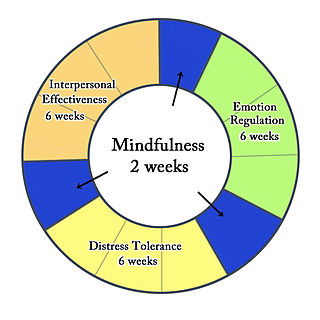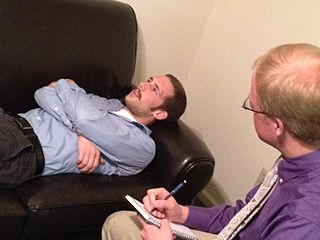
Cognitive behavioral therapy (CBT) is a form of psychotherapy that aims to reduce symptoms of various mental health conditions, primarily depression, PTSD and anxiety disorders. Cognitive behavioral therapy focuses on challenging and changing cognitive distortions and their associated behaviors to improve emotional regulation and develop personal coping strategies that target solving current problems. Though it was originally designed to treat depression, its uses have been expanded to include many issues and the treatment of many mental health and other conditions, including anxiety, substance use disorders, marital problems, ADHD, and eating disorders. CBT includes a number of cognitive or behavioral psychotherapies that treat defined psychopathologies using evidence-based techniques and strategies.
Psychology is an academic and applied discipline involving the scientific study of human mental functions and behavior. Occasionally, in addition or opposition to employing the scientific method, it also relies on symbolic interpretation and critical analysis, although these traditions have tended to be less pronounced than in other social sciences, such as sociology. Psychologists study phenomena such as perception, cognition, emotion, personality, behavior, and interpersonal relationships. Some, especially depth psychologists, also study the unconscious mind.

Dialectical behavior therapy (DBT) is an evidence-based psychotherapy that began with efforts to treat personality disorders and interpersonal conflicts. Evidence suggests that DBT can be useful in treating mood disorders and suicidal ideation as well as for changing behavioral patterns such as self-harm and substance use. DBT evolved into a process in which the therapist and client work with acceptance and change-oriented strategies and ultimately balance and synthesize them—comparable to the philosophical dialectical process of thesis and antithesis, followed by synthesis.

Aaron Temkin Beck was an American psychiatrist who was a professor in the department of psychiatry at the University of Pennsylvania. He is regarded as the father of cognitive therapy and cognitive behavioral therapy (CBT). His pioneering methods are widely used in the treatment of clinical depression and various anxiety disorders. Beck also developed self-report measures for depression and anxiety, notably the Beck Depression Inventory (BDI), which became one of the most widely used instruments for measuring the severity of depression. In 1994 he and his daughter, psychologist Judith S. Beck, founded the nonprofit Beck Institute for Cognitive Behavior Therapy, which provides CBT treatment and training, as well as research. Beck served as President Emeritus of the organization up until his death.
Cognitive restructuring (CR) is a psychotherapeutic process of learning to identify and dispute irrational or maladaptive thoughts known as cognitive distortions, such as all-or-nothing thinking (splitting), magical thinking, overgeneralization, magnification, and emotional reasoning, which are commonly associated with many mental health disorders. CR employs many strategies, such as Socratic questioning, thought recording, and guided imagery, and is used in many types of therapies, including cognitive behavioral therapy (CBT) and rational emotive behaviour therapy (REBT). A number of studies demonstrate considerable efficacy in using CR-based therapies.
Emotional reasoning is a cognitive process by which an individual concludes that their emotional reaction proves something is true, despite contrary empirical evidence. Emotional reasoning creates an 'emotional truth', which may be in direct conflict with the inverse 'perceptional truth'. It can create feelings of anxiety, fear, and apprehension in existing stressful situations, and as such, is often associated with or triggered by panic disorder or anxiety disorder. For example, even though a spouse has shown only devotion, a person using emotional reasoning might conclude, "I know my spouse is being unfaithful because I feel jealous."
Emotional dysregulation is characterized by an inability to flexibly respond to and manage emotional states, resulting in intense and prolonged emotional reactions that deviate from social norms, given the nature of the environmental stimuli encountered. Such reactions not only deviate from accepted social norms but also surpass what is informally deemed appropriate or proportional to the encountered stimuli.
The cognitive behavioral analysis system of psychotherapy (CBASP) is a talking therapy, a synthesis model of interpersonal and cognitive and behavioral therapies developed by James P. McCullough Jr. of Virginia Commonwealth University specifically for the treatment of all varieties of DSM-IV chronic depression. McCullough writes that chronic depression, particularly the type beginning during adolescence (early-onset), is essentially a refractory mood disorder arising from traumatic experiences or interpersonal psychological insults delivered by the patient's significant others.

In applied psychology, interventions are actions performed to bring about change in people. A wide range of intervention strategies exist and they are directed towards various types of issues. Most generally, it means any activities used to modify behavior, emotional state, or feelings. Psychological interventions have many different applications and the most common use is for the treatment of mental disorders, most commonly using psychotherapy. The ultimate goal behind these interventions is not only to alleviate symptoms but also to target the root cause of mental disorders.
Cognitive therapy (CT) is a type of psychotherapy developed by American psychiatrist Aaron T. Beck. CT is one therapeutic approach within the larger group of cognitive behavioral therapies (CBT) and was first expounded by Beck in the 1960s. Cognitive therapy is based on the cognitive model, which states that thoughts, feelings and behavior are all connected, and that individuals can move toward overcoming difficulties and meeting their goals by identifying and changing unhelpful or inaccurate thinking, problematic behavior, and distressing emotional responses. This involves the individual working with the therapist to develop skills for testing and changing beliefs, identifying distorted thinking, relating to others in different ways, and changing behaviors. A cognitive case conceptualization is developed by the cognitive therapist as a guide to understand the individual's internal reality, select appropriate interventions and identify areas of distress.
Leslie Samuel Greenberg is a Canadian psychologist born in Johannesburg, South Africa, and is one of the originators and primary developers of Emotion-Focused Therapy for individuals and couples. He is a professor emeritus of psychology at York University in Toronto, and also director of the Emotion-Focused Therapy Clinic in Toronto. His research has addressed questions regarding empathy, psychotherapy process, the therapeutic alliance, and emotion in human functioning.
Emotionally focused therapy and emotion-focused therapy (EFT) are related humanistic approaches to psychotherapy that aim to resolve emotional and relationship issues with individuals, couples, and families. These therapies combine experiential therapy techniques, including person-centered and Gestalt therapies, with systemic therapy and attachment theory. The central premise is that emotions influence cognition, motivate behavior, and are strongly linked to needs. The goals of treatment include transforming maladaptive behaviors, such as emotional avoidance, and developing awareness, acceptance, expression, and regulation of emotion and understanding of relationships. EFT is usually a short-term treatment.
Common factors theory, a theory guiding some research in clinical psychology and counseling psychology, proposes that different approaches and evidence-based practices in psychotherapy and counseling share common factors that account for much of the effectiveness of a psychological treatment. This is in contrast to the view that the effectiveness of psychotherapy and counseling is best explained by specific or unique factors that are suited to treatment of particular problems.
Guided imagery is a mind-body intervention by which a trained practitioner or teacher helps a participant or patient to evoke and generate mental images that simulate or recreate the sensory perception of sights, sounds, tastes, smells, movements, and images associated with touch, such as texture, temperature, and pressure, as well as imaginative or mental content that the participant or patient experiences as defying conventional sensory categories, and that may precipitate strong emotions or feelings in the absence of the stimuli to which correlating sensory receptors are receptive.
Schema therapy was developed by Jeffrey E. Young for use in treatment of personality disorders and chronic DSM Axis I disorders, such as when patients fail to respond or relapse after having been through other therapies. Schema therapy is an integrative psychotherapy combining theory and techniques from previously existing therapies, including cognitive behavioral therapy, psychoanalytic object relations theory, attachment theory, and Gestalt therapy.
Cognitive emotional behavioral therapy (CEBT) is an extended version of cognitive behavioral therapy (CBT) aimed at helping individuals to evaluate the basis of their emotional distress and thus reduce the need for associated dysfunctional coping behaviors. This psychotherapeutic intervention draws on a range of models and techniques including dialectical behavior therapy (DBT), mindfulness meditation, acceptance and commitment therapy (ACT), and experiential exercises.
Metacognitive therapy (MCT) is a psychotherapy focused on modifying metacognitive beliefs that perpetuate states of worry, rumination and attention fixation. It was created by Adrian Wells based on an information processing model by Wells and Gerald Matthews. It is supported by scientific evidence from a large number of studies.
Vittorio Filippo Guidano was an Italian neuropsychiatrist, creator of the cognitive procedural systemic model and contributor to constructivist post-rationalist cognitive therapy. His cognitive post-rationalist model was influenced by attachment theory, evolutionary epistemology, complex systems theory, and the prevalence of abstract mental processes proposed by Friedrich Hayek. Guidano conceived the personal system as a self-organized entity, in constant development.

Michelle G. Craske is an Australian academic who is currently serving as Professor of Psychology, Psychiatry, and Behavioral Sciences, Miller Endowed Chair, Director of the Anxiety and Depression Research Center, and Associate Director of the Staglin Family Music Center for Behavioral and Brain Health at the University of California, Los Angeles. She is known for her research on anxiety disorders, including phobia and panic disorder, and the use of fear extinction through exposure therapy as treatment. Other research focuses on anxiety and depression in childhood and adolescence and the use of cognitive behavioral therapy as treatment. Craske has served as President of the Association for Behavioral and Cognitive Therapy. She was a member of the DSM-IV work group on Anxiety Disorders and the DSM-5 work group on Anxiety, Obsessive Compulsive Spectrum, Posttraumatic, and Dissociative Disorders, while chairing the sub-work group on Anxiety Disorders. She is the Editor-in-chief of Behaviour Research and Therapy.





